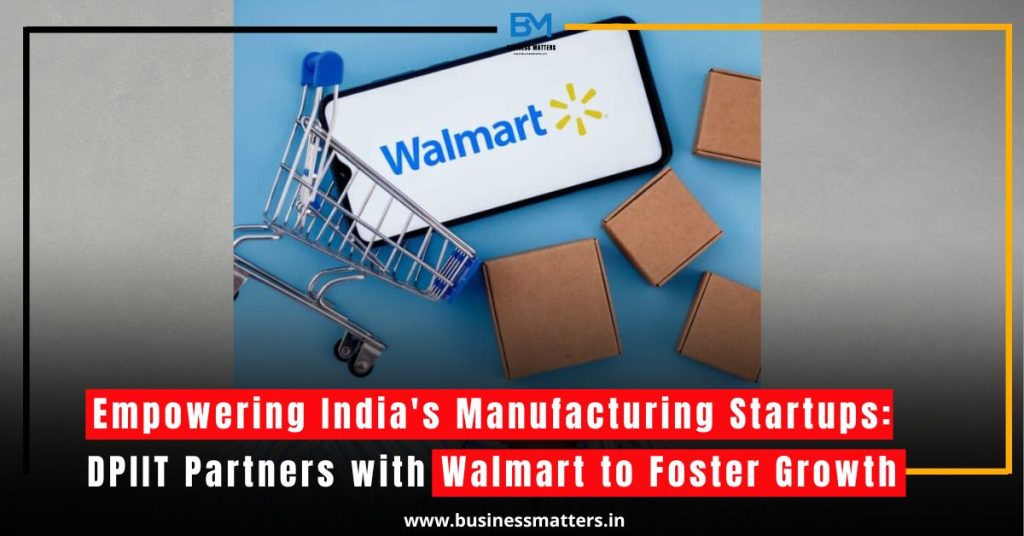In a significant step towards strengthening India’s manufacturing startup ecosystem, the Department for Promotion of Industry and Internal Trade (DPIIT), under the Ministry of Commerce & Industry, has signed a Memorandum of Understanding (MoU) with global retail giant Walmart. This partnership aims to provide critical support to startups, along with micro, small, and medium enterprises (MSMEs), particularly in Tier II and Tier III cities. The MoU was announced on January 17, 2025, by Sanjiv Singh, Joint Secretary at DPIIT, in a post on LinkedIn.
The primary objective of the partnership is to provide strategic support to manufacturing startups, helping them scale up their operations and gain access to global markets. The collaboration will offer mentorship, training, and capacity-building opportunities for entrepreneurs, especially those in less-developed regions of India. The DPIIT and Walmart initiative is a much-needed intervention for these businesses, many of which struggle to compete with larger, more established companies due to limited resources and market access.
Empowering Startups Beyond Tier I Cities: DPIIT and Walmart’s Initiative for Inclusive Growth
One of the most remarkable aspects of this partnership is its emphasis on empowering startups from India’s Tier II and III cities. While Tier I cities like Delhi, Mumbai, and Bengaluru often dominate the startup scene, many promising manufacturing ventures are emerging from smaller cities. However, these startups face unique challenges such as limited infrastructure, lack of access to finance, and an absence of industry-specific knowledge and networks. The partnership between DPIIT and Walmart seeks to address these challenges by providing tailored support that can help these businesses expand their reach both within India and internationally.
By focusing on regions outside the traditional startup hubs, this initiative aligns with the Indian government’s broader goals of fostering inclusive growth and boosting local economies. It is expected to not only empower entrepreneurs but also create job opportunities in underserved regions, driving economic development at the grassroots level.
What the Partnership Brings to the Table
Through this collaboration, DPIIT and Walmart will offer a wide range of services designed to help startups navigate the complexities of scaling up. This includes mentorship from industry experts who can guide founders through challenges related to product development, supply chain management, and business operations. In addition, Walmart’s extensive experience in retail, e-commerce, and logistics will provide invaluable insights to startups looking to expand their reach.
Furthermore, training programs will be organized to help startups enhance their manufacturing capabilities, improve product quality, and adopt global best practices. The training will also cover critical areas such as digital transformation, which has become essential for businesses to remain competitive in today’s fast-evolving market.
Startups will also gain access to Walmart’s vast network, providing them with opportunities to connect with potential partners, suppliers, and customers. This can prove to be a game-changer, particularly for MSMEs that have historically struggled to establish strong business connections beyond their local markets.
Impact on India’s Economy
This partnership comes at a time when India’s government is keen on making the country a global manufacturing hub. By supporting manufacturing startups, the initiative aligns with the “Make in India” and “Atmanirbhar Bharat” (self-reliant India) campaigns. It encourages innovation, fosters entrepreneurship, and contributes to the country’s goal of becoming a global leader in manufacturing.
Additionally, by empowering startups in Tier II and III cities, the collaboration is expected to reduce regional imbalances, making the manufacturing sector more inclusive and distributed across India. This will lead to more balanced economic growth, ensuring that India’s manufacturing revolution benefits all parts of the country, not just the major urban centers.
Conclusion
The MoU between DPIIT and Walmart represents a significant milestone in India’s efforts to create a more vibrant and sustainable manufacturing ecosystem. With support from one of the world’s largest retail corporations, Indian manufacturing startups are poised to access the resources and expertise they need to grow, innovate, and compete on the global stage. As the initiative progresses, it could serve as a model for future collaborations between the government and the private sector, showcasing the potential for synergistic partnerships to drive economic growth and entrepreneurship in India.


